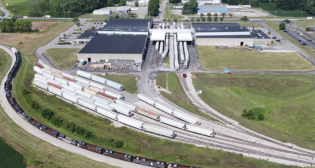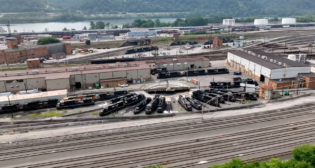
Redux for NMB-Fee Argy-bargy?
Written by Frank N. Wilner, Capitol Hill Contributing EditorRAILWAY AGE, WATCHING WASHINGTON, OCTOBER 2017: As the three-member National Mediation Board (NMB) shifts to Republican control for the first time since 2009, a knotty issue lying dormant since 2006 may emerge: Who pays for binding arbitration to resolve grievances over interpretation of collectively bargained labor contracts and employee discipline?
The two new Republicans arrive with clean slates on rail labor issues. Kyle H. Fortson’s strength is her knowledge of labor law. Gerald W. (Trey) Fauth III is strong on rail economics and operations. Democrat Linda A. Puchalla, with an airline labor union background, expertise in alternative dispute resolution and no documented position on rail arbitration user fees, is serving a third term since her first Senate confirmation in 2009.
While political party affiliation has been less evident in NMB decisions than at some other independent regulatory agencies, convention holds that labor unions have more friends in the Democratic Party; carriers more among Republican politicos.
Consider the NMB’s statutory responsibility for the appointment and compensation of neutral arbitrators who resolve, through binding decisions, Railway Labor Act (RLA) “minor disputes” over contract interpretation and employee discipline for which work stoppages are prohibited.
The compensation and travel expenses of the neutral arbitrators assigned to rail cases—a current cost of $1.2 million annually—is funded entirely by taxpayers. One could assume that federal budget hawks of all political stripes, particularly Republicans, oppose the subsidy that is not required by law.
In 2004, Republican NMB member Read Van de Water advanced, as part of proposed changes “to rules and procedures to facilitate the more timely resolution of grievances,” user fees for rail arbitrations.
Notwithstanding that airlines and their unions—also subject to the RLA—share the costs of NMB administered binding arbitration, an argy-bargy erupted. Rail labor unions said the taxpayer subsidy was justified in lieu of a statutory prohibition of work stoppages over “minor disputes”—a small price to pay for labor peace.
Railroads countered that union actions—citing examples of work stoppages over disputes subsequently found to be “minor” and arbitrable—belied the unions’ professed commitment to binding arbitration. Moreover, an absence of user charges discourages less-formal, on-property grievance resolution, and invites frivolous filings.
Predictably, the NMB’s then-lone Democrat, Harry Hoglander, opposed imposing user fees, but Van de Water was unable to squeeze a deciding vote out of fellow Republican Edward Fitzmaurice, who allegedly was avoiding controversy while awaiting a renomination that never occurred. His Republican successor, Elizabeth Dougherty, might have provided the deciding vote, but it wasn’t sought, and the pending rulemaking languished.
Concern developed that the case consolidation and scheduling provisions of the Van de Water proposed rules change—not the user fee provision—could not survive a court challenge. In fact, a federal court later ruled that the NMB’s subsequent cost-saving consolidation of 31 separate grievances filed by the Brotherhood of Maintenance of Way Employes against CSX was “a gross violation” by the NMB of the RLA.
Yet the proposed rulemaking wasn’t withdrawn by the NMB. It remains outstanding and could be finalized, even with tweaks, absent new preliminaries. Thus, the new Republican majority of Fauth and Fortson could dust it off—perhaps separating out for voting the user fee provision—and defend it under the Independent Offices Appropriation Act rather than the RLA, which carriers had suggested when the rule was first proposed.
There is no present reason to suppose that new Republicans Fauth and Fortson, or incumbent Democrat Puchala, have staked out a position, or that any of them is steeped in the pro and con arguments of a rulemaking lying fallow for more than a decade—and since before Puchala arrived in 2009. Yet, less government, and assuredly, less government spending, is the very DNA of the Trump Administration and the Republican-controlled Congress. Moreover, there have been numerous occasions where the NMB had to curtail these arbitration activities, owing to late-fiscal-year budget shortfalls.
Although in 2004 railroads advocated even higher fees than the NMB proposed, railroads say they now have zero interest in pursuing the shift of cost responsibility from taxpayers to the interested parties.
As for the new NMB Republican majority, they have inherited budget responsibilities in an era of continuingly diluted federal spending, and they further must contend with those who put them at the NMB—Republican lawmakers who have congressional oversight of the agency , little patience for bureaucrats who hesitate where and when federal spending may be reduced, and an urgent need for spending reductions to fund tax cuts.



